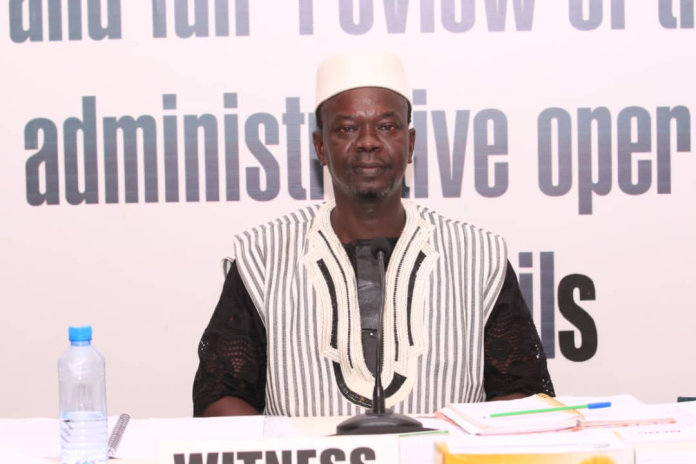The former Director of Finance at Banjul City Council (BCC), Momodou Camara, has accused senior officials at the Council of orchestrating and benefiting from a long-running illegal invoicing scheme that allegedly suppressed trade license revenues and diverted public funds. Camara, who served in the position during the time covered by the Local Government Commission of Inquiry, testified on Monday, May 6, 2025, regarding alleged financial manipulation within the capital’s local government.
Camara said that shortly after his appointment, he discovered that major companies such as QCell, Gamcel, and Gamtel were being deliberately under-invoiced, with invoices that did not reflect the full scope of their business activities. “When I took office, QCell was being invoiced D500,000 annually,” Camara testified. “But when I reviewed the Trade License Act, I realized this figure was grossly inaccurate. Key components of their business — such as GSM operations, data services, and infrastructure installations — were not being captured.”
Camara said he summoned Pa Modou Ndow, the then acting trade license manager, to clarify the invoicing process. “I told him, ‘You are under-invoicing these people.’ He had no formal training in finance or public administration. He was willing, but lacked the capacity,” Camara explained. According to him, both men sat down with the Trade License Act and recalculated QCell’s dues at D1.2 million. A new invoice was issued, and two days later, QCell owner Muhammed Jah reportedly showed up at the Council.
“He told me, ‘I noticed our invoice went up.’ I explained why, gave him a copy of the Act, and itemized the components we were now charging. He agreed and said, ‘I’ll pay tomorrow.’ And he did,” Camara said.
However, that adjustment, Camara said, triggered a backlash from senior Council officials. “That’s when the war started,” he told the Commission. “The same day I shared plans to suspend all invoicing and launch a comprehensive business registration and valuation exercise, chaos erupted. The next day I was arrested. Council staff tried to forcibly access my office to seize documents.”
Camara alleged that CEO Mustapha Batchilly, Council Advisor Makumba Sane, and Trade License Manager Pa Modou Ndow used pre-signed invoice books bearing his signature to collect revenue outside of official channels. “They used pre-signed invoice books bearing my signature to continue collecting revenue without my knowledge,” he said.
He submitted a memo dated January 10, 2024, now marked as exhibit LGC/BCC/MC(1)/018, which detailed the unauthorized use of invoices, circumvention of financial regulations, and suppression of lawful revenue. Though dated outside the Commission’s investigative period, Camara said it captured longstanding practices that began well before.
Camara also cited the case of A&M Textiles, which he said operated large warehouses in Banjul but were only charged general trader fees. “The Act is clear,” Camara said. “These are deliberate omissions, not errors. It’s not rocket science. Anyone who understands the Act can see what each business should pay. But people in charge chose not to apply it — either out of incompetence or corruption.”
Responding to questions from the Commission, Camara dismissed the suggestion that such under-invoicing could be attributed to genuine mistakes. “The finance director before me was laid back — or corrupt. If someone should be paying one million dalasis, and they’re invoiced for five hundred thousand, the gap doesn’t disappear. That money goes somewhere. They save the business owner a large sum, and then share a portion of that saving under the table.”
He added, “Councils are like organized clubs. When you come in and try to change things, you pay the price. If I had been timid, if I had not taken responsibility, I would not have faced the storm.”
Camara said he believed the corruption was institutionalized and that actors like Makumba Sane benefited from it. “The Commission has seen huge sums of money moving through his account, far beyond what his official earnings would justify. So they don’t do this out of ignorance — they know what they’re doing.”
After filing the January 10 memo, Camara testified, he was excluded from Council activities. “After I submitted that memo, I was no longer invited to management meetings. I was sidelined. There was no written response to the memo from the CEO or any senior official. Nothing. Absolute silence.”
He told the Commission that he had been out of the country for six years, living in East London, and returned to serve in the Banjul Council. “I’ve been away from The Gambia for six years,” he said. “My first senior-level government role was in 2009.”
After hearing Camara’s testimony, Lead Counsel Patrick Gomez remarked, “What you discovered is not complex. Anyone reviewing the turnover figures could see these companies were underpaying. This is deliberate.”
Camara agreed. “When I took over corporate accounts, revenue from large companies surged. It’s just that nobody wanted to go there. Once I did, it started the war that led to my transfer.”
Lead Counsel Patrick Gomez concluded by tying Camara’s allegations to earlier evidence. “You have testified that you discovered a deliberate pattern of under-invoicing and suppression. We’ve already heard that both Makumba Sane and Pa Morundao were involved in unauthorized revenue collection..”
“If people cared about their legacy or this country, the change would have happened,” he said. “But they didn’t. They cared about their pockets.”


















